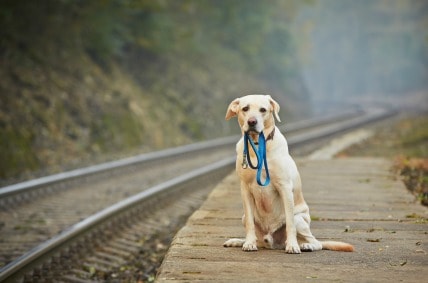Prevent your dog from getting lost to avoid the heartache. A surprising number of dogs are lost everyday as the result of avoidable or careless errors on the part of their humans. Dogs are much like two year old children who need protecting. Knowing ways to protect and safeguard your pet can help to prevent your dog from getting lost.
Helpful Items To Prevent Your Dog From Getting Lost
This post may contain affiliate links which means if you make a purchase from a link on this site, I will earn a small commission. This helps to support the site and keep it going but you will not pay a penny extra.
Dog Harnesses:
This is a great harness – strong, durable and has the extra advantage of being illuminated to be seen easily by cars at night. http://amzn.to/2ugCAPw
Indoor Dog Gate:
This gate pressure mounts for ease of set-up and take down. Extra tall for larger dog breeds. http://amzn.to/2IIXmu7
Pet GPS Tracker:
This tracker is affordable and rates highly in tracking your dog. http://amzn.to/2pwkX9f
Pet ID Tags:
Important to have your pet tagged with all his info. for a safe return home. There are many well-priced options here. http://amzn.to/2GbV2NM
Tips to Prevent Your Dog From Getting Lost
Get Your Dog Microchipped
Above all else, when you first get your dog, get him microchipped. This is a simple procedure done in your
Price is very reasonable to do this. We decided to register our dog’s chips through the American Society for the Prevention of Cruelty to Animals (ASPCA), which charges $17.50 for a lifetime enrollment. No matter who you register through, the information is fed into a national database. If a shelter picks up your lost dog, they will scan and then notify you that they have them. If someone finds your dog, they can take them to any veterinarian or shelter to be scanned.
Be sure to keep your information updated with your registry as to any change of address or phone numbers. According to the ASPCA, dogs without microchips are returned home 21.9% of the name, while dogs with microchips are returned home 52.2% of the time. Further, the ASPCA states that in cases where microchipped dogs could not be reunited with their owners, it was usually due to the chip never being registered or the information not updated. Although microchipping will not actually prevent your dog from getting lost, it will help to get him home quicker.
Get Your Dog an ID Tag
ID tags are another item that will not actually prevent your dog from getting lost but helps to get them home sooner. The ID tags should not be used in place of the microchip, but rather, in addition to it. Tags can fall off or become unreadable over time. The nice thing about tags, providing they are readable, is that anyone that finds your dog will be able to notify you immediately.
Keep Your Dog Confined When Outside
Your dog should never be allowed to be outside without being inside a fenced area or on a lead. Make sure your fence is high enough and the gates are secure. Regularly check the fence to insure it is in geed repair and that your dog has not dug any escape routes under the fence. While I prefer a fence to a tieout, if the latter is necessary, make sure it is the proper strength for your dog and that it is in good shape. Don’t leave your dog tied out unsupervised, as it is too easy for him to become tangled or hung up. When your dog is outside in the evening, be sure to have the area well-lit. This can help to deter potential dog-nappers. The stealing of dogs is a very real problem. We talk more about preventing your dog from being stolen here.
Use Gates Inside Your Home
Using gates between doorways, especially in ares that lead to outside door, can help prevent your dog from getting lost. Many times I’ve heard about children carelessly opening doors or leaving doors ajar, only to have their beloved pet make a getaway.
Use Safe Collars and Leashes When Walking Your Dog
Make sure your dog’s collar fits properly, not too tight but not too loose. I actually prefer a harness to a leash as it is harder for the dog to wiggle out of and does not pull on the dog’s neck when walking. The leash should be a proper size in accordance with your dog’s weight and strength.
Sometimes, even with all your best precautions, your dog may become lost. Here are some great ideas to Help Find A Lost Dog.
